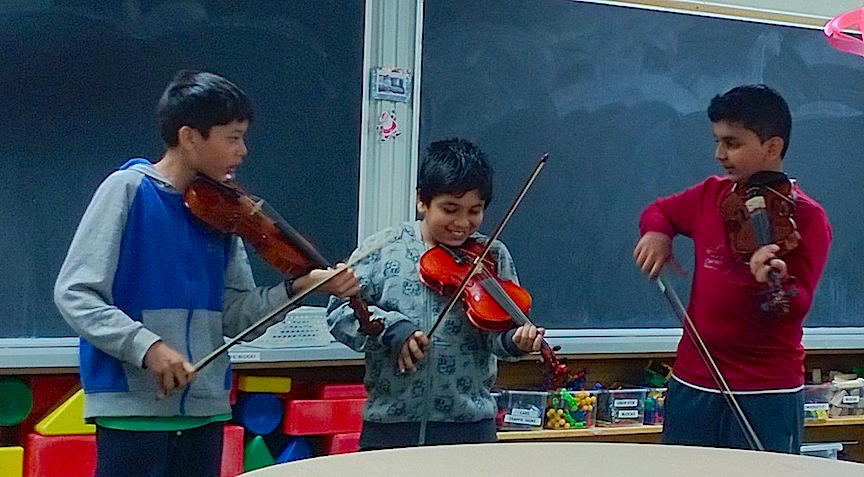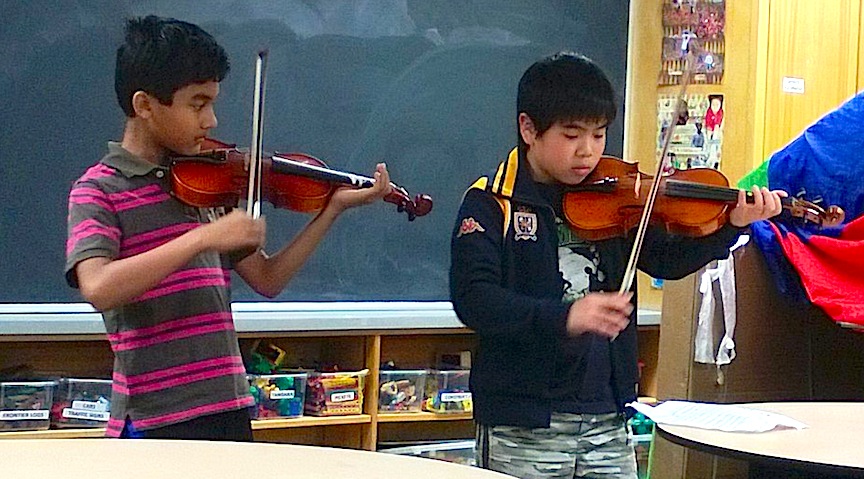
It takes determination, grit and single-mindedness to succeed in music — just as it does to effect social change. So imagine what a particularly determined musician — in this case violinist Moshe Hammer — can accomplish when he wants to change the course of a child’s life.
- Classical Music 101: What Does A Conductor Do? - June 17, 2019
- Classical Music 101 | What Does Period Instrument Mean? - May 6, 2019
- CLASSICAL MUSIC 101 | What Does It Mean To Be In Tune? - April 23, 2019
Hammer is one of a growing army of people making music lessons available to Toronto-area schoolchildren — especially in socioeconomically challenged neighbourhoods.
We have Sistema Toronto, which started in Parkdale, and is looking to expand its model of five-day-a-week after-school instruction.
There are schools that provide individual and group lessons at hugely subsidized rates — places like the venerable University Settlement school serving Grange Park and environs, and, further east, the Dixon Hall Music School and Regent Park School of Music (with which I’m involved), which has expanded to Parkdale as well as the Jane-Finch neighbourhoods.
Many music ensembles and concert presenters provide musical outreach to the city’s schools. This is meant to complement what once was one of the better North American cities for school music.
But the Toronto District School Board is considering cuts to its music programmes for next year. And, a couple of weeks ago, the Toronto Symphony Orchestra quietly announced in an internal memo that it is eliminating in-school outreach in order to cut expenses.
Enter Moshe Hammer and his Hammer Band concept. It is a hybrid of the Sistema (every day after school), one-day-a-week-music-school and regular outside professional visit-to-schools models.
Hammer’s project began with a group of kids once a week after school at Elia Middle School on Sentinel Rd — a short walk down the street from CW Jefferys Collegiate, which has seen more than its fair share of gun violence — in 2007.
I followed Hammer into the school’s cafeteria-cum-gym-cum-auditorium to see how he helped instill a sense of ownership over the donated instruments, a sense of responsibility to practice, a sense of cooperation with the other students and, ultimately, a sense of accomplishment with the musical results at the end of the school year.
There were less than 20 kids present the afternoon I came as an observer to a school that had to lock its doors in the daytime to make sure its young charges were kept safe.
The violinist’s goal was to add a group every year, then follow the kids to junior high as they progressed.
Six years later, Hammer has a teaching team of six for his once-a-week programme — including Tafelmusik regular and Classical Revolution Toronto activist Edwin Huizinga — that goes to 19 schools and reaches about 375 students. There is even a cello contingent now — one that Hammer hopes will grow.
Thirteen of those schools, including Elia Middle School, are in the northwestern sector of Toronto. The Hammer Band is also present in three Regent Park-area schools and three in the Crescent Town district in the east end.
The organization’s work includes two week-long summer camps and, for the first time this year, a summer school based out of Sprucecourt Public School, which sits on the border between Regent Park and Cabbagetown.
I visited George Webster Elementary School in the east end on Thursday morning to see how violin teacher Xiao Grabke was getting along with the 20 kids in her care. Hammer, an inexhaustible combination of coach and cheerleader, was there, too.
The George Webster students were in high spirits — fuelled by sunny weather and needing to be prepared for their school’s upcoming talent show as well as a mass concert by the Hammer Band to open this year’s edition of Idea City at Koerner Hall, in June.
Each child gets a violin, bow, block of rosin (the sticky stuff that helps the horsehair connect with the strings) and a case. These are inexpensive starter instruments meant to get fingers and arms used to the particular contortions of violin-playing. Many of the kids had added little kitchen scouring pads to the back of their instruments as makeshift rests.
This was the second year of group lessons for some of these children, and the results were impressive. This plucky duo played a simplified duet of Spring from Vivaldi’s Four Seasons to show that they were ready for their talent show:
At no point during this particular class did I get the impression that any of these kids was playing their instrument under duress. They were clearly having a good time, encouraging each others’ performances and providing little critiques as well as positive reinforcement.
During a quieter moment, one of the students told Hammer how he and two friends will be continuing their French immersion studies at Cosburn Middle School next year, and how they would like him to set up lessons there, as well.
“Is it close by?” Hammer asked Grabke.
“Yes, it’s just a few blocks away,” she replied.
“Okay, then let’s do it. I’ll get in touch with the principal,” Hammer declared.
And the music resumed.
Hammer turned to me and quietly said, “You see, if I get them at this age for three or four years, when the gang recruiters come to them in high school, they won’t be interested. I’m not interested in the next Heifetz or Dudamel. I just want these children to be better people.”
We could build a condo tower with the studies that have shown all the good things that group-focused creative and athletic activities do for kids, and how music lessons make for better math students, etc. The Royal Conservatory of Music has developed entire curricula of teaching regular school subjects using music and movement and plastic arts, but it’s hard to change an entrenched educational system.
It’s also hard to argue with dollars — which, by the Toronto Star‘s accounts, the Toronto District School Board may not be managing in the most efficient way possible. Fixing maintenance contracts is tough. Cutting music instruction is easy.
So, with money raised from concerned individuals, and the occasional donated violin and cello, and the help of performers and teachers who can see the results of their hard work take shape right here and right now, people like Hammer are building a parallel music-teaching universe in the GTA.
School music cutbacks are everywhere. “It’s a tragedy; it’s not even a scandal anymore,” says Hammer.
And he’s doing something about it.
He says he has received interest from schools in Brampton, and that people have been making enquiries about his violin-band concept from Kitchener-Waterloo and as far away as Chicago. Sistema-type organizations are thriving around the world and, in Canada, here, in Ottawa and New Brunswick.
I have a big personal beef with private money having to do what public money is supposed to. But our kids are better off for it.
The Hammer Band and every other not-for-profit I’ve mentioned has to work hard every day of the year to make ends meet. So support them. Go out to their concerts — many of which are happening in coming weeks as the school year draws to a close. Talk to the children and their teachers. Donate an instrument, a bow, a piano tuning, your old sheet music.
This is the sort of person-by-person, person-to-person social change that nets immediate, positive results. How can you argue with that?
You can find out more about the Hammer Band here.
John Terauds
- Classical Music 101: What Does A Conductor Do? - June 17, 2019
- Classical Music 101 | What Does Period Instrument Mean? - May 6, 2019
- CLASSICAL MUSIC 101 | What Does It Mean To Be In Tune? - April 23, 2019




